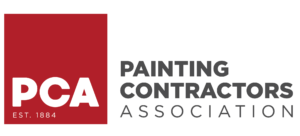03: How to Monetize Your Blog
The next step to dominating online is learning how to monetize your website. One of the best things to learn is how to make money with a blog.
All Chapters List
Chapter 03 Overview
We want to stress that there is no “get rich quick” schemes. Most of those won’t help you generate revenue for the long-term, but they will waste your time. Companies that blog receive 97 percent more links to their site, but what do you do with that traffic to make real money?
We want to help you with real strategies that coincide with your blog content and business goals. Most people think about display ads and pop-ups when they talk about making money with blogging, but there are a variety of methods to choose from. The good thing is that how much you make is up to you.
Want to make a lot of money with blogging? You’ll have to put the time and energy into a method that feels right. Leads to sales, affiliate marketing, eCommerce/direct selling, and selling an eBook or online course are four monetization methods that have proven to be the most successful and easiest to get into. Let's take a closer look!
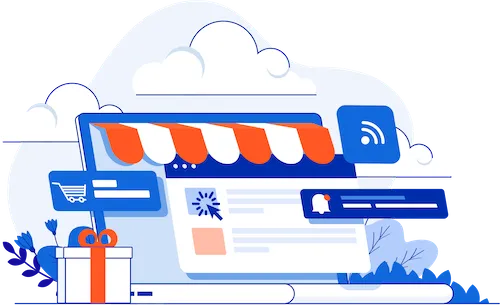
Lead Generation to Sales
Lead generation is the most popular way to monetize a blog, but there is always another business behind it. There are three main approaches to monetizing your blog through lead generation.
Consultant
Most bloggers try to write expert content that informs and helps readers. Perhaps you have a history within a certain industry and want to solve problems, answer questions, and strategize for your readers based on your own experience.
Consultant bloggers can easily monetize by adding a call-to-action on their blogs that include a form or email to contact them for additional services.
You can charge clients by the hour and offer consultations via Skype, or even propose an in-person meeting for a larger contract.
This strategy is dependent on the quality and expertise of your content. You must frequently blog and conduct keyword research that matches your target audience’s intent.
When writing for B2B audiences, it’s important to speak the language and offer insights that only an industry expert would know.
Original videos, infographics, and illustrations are also helpful to building up your expertise and showing readers that you are the real deal.
Agency
As an agency, it can be tempting to focus solely on client work and never try to monetize a blogging space. This is a huge mistake because blogs are actually the perfect place to showcase an agency’s best work and share it with the world.
From case studies to guides to insider knowledge, agencies can provide expert content or even simply talk about a strategy as a case study to pull in leads for their business.
For example:
If you are a digital creative agency, you might use your blog to publish your best work. With beautiful images of your web design and some statistics to reveal a bit about the strategy, you show off just how meticulous and sophisticated your agency would be to a potential client reading the post.
Instead of having a CTA that links to a "contact us page" or a long-form, agencies should consider that their target markets are typically executives or marketing managers for larger businesses looking for creative or specialized services.
In these cases, your CTA could simply be a clever email at the bottom of the post:
"Want to become a client? Talk to us about your idea. We’d love to help. Email our client development team at [email protected]."
Local Business
Lead generation for local businesses really focuses on SEO and social media sharing. Local businesses really shine when they use their blog for community outreach and events. You can showcase your products and services as they are being used and by offering behind-the-scenes content to educate your readers about what you’re doing.
For example, as a local wedding photographer, you could build a blog around weddings, themes, locations, photoshoot tips, and other ideas that focus on celebrating love and romance.
Your posts can include a simple CTA at the bottom that leads to a scheduler, which is essentially a lead form but it includes a field for setting up a time to talk about their special day and photoshoot. These leads are also easier to qualify because people are interested in providing more contact information.
This method works for many local businesses from salons to party planners to catering companies. The key is to build your content around the niche and then include photos, videos, and stories from your business.
Nurturing Your Leads with Email Marketing
All lead generation requires an email marketing platform to back up and deliver on their promise. If you are offering a free consultation, discount, or tickets to an event, then your lead should always receive an email that confirms everything they just read and what's going to happen next.
This is called a lead nurture series.
While confirming their submission, you also supply more information, making your product and services look more valuable and trustworthy. At the end of this series, you also include a link to other products that can be purchased or prep the lead for a follow-up meeting.
As you build up your list, you can use email marketing to send personalized messages about your products, notify subscribers of a new post, or promote an upcoming event. The options are endless, which is why email marketing is so beneficial for businesses with blogs.
Affiliate Marketing
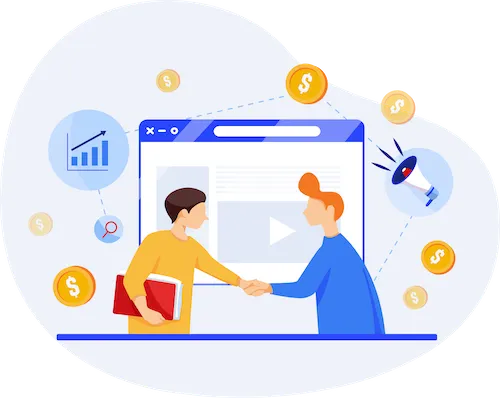
How to Use Affiliate Marketing
For example, you sign up as a HostGator affiliate because you own a tech blog and write about web hosting. Whenever you write a piece of content where adding a web host affiliate might work, you add in your affiliate link and generate some revenue whenever it’s clicked.
So should you create a blog and just start clogging it up with affiliate links? That’s not how it works.
Affiliate marketing has an easy starting point, and you don’t have to do very much to make money. Every approach typically follows this formula:
- You make recommendations through your blog or email list.
- Your readers click and purchase a product using the affiliate link provided.
- When a sale is made, you get paid a commission, so long as the sale occurs from your affiliate link.
However, your content, link placement, and keyword research all play a role in how successful this strategy will be for your revenue.
How Much Can You Make with Affiliate Marketing?
Affiliate marketing revenue is based on commissions. You earn a percentage of the sale so long as the customer came from your affiliate link.
In some cases, you can make over $1,000 per sale, and in other cases, it’s just a few cents. It all depends on the niche.
Web hosting is one of the most popular affiliate marketing niches, and you can make a ton of money on businesses looking for hosting products, as they typically spend thousands of dollars. However, it’s best to research a variety of affiliate marketing partners or even create your own brand partnership to get the best rates.
Know Your Audience
Everything in content marketing and affiliate marketing comes down to the customer.
- What products will they likely click on?
- What content will inspire them to purchase?
It’s best to build buyer personas and develop content that answers their most desperate questions about a topic. Once you know your audience, you can narrow down the types of products and brands that they’d be interested in.
Choose the Best Affiliate Partners
There are a ton of affiliate marketing networks out there, and there are also brands with no affiliate marketing program. However, that doesn’t mean you can’t find a brand and turn them into an affiliate marketing partner.
The best way to meet affiliates is to look for publishers who offer a unique value and who want to work with blogs like yours.
Brands may also advertise affiliate marketing under another link, so you can always search “[brand name] + affiliate program” to see what’s available.
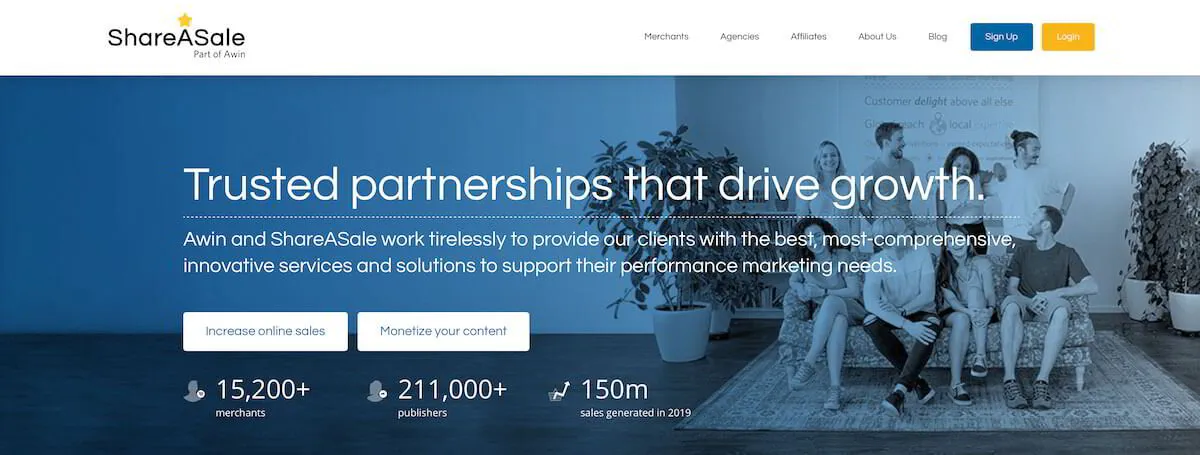
Finally, working with a trusted affiliate marketing network may be the easiest route when you’re just getting started. However, you should always check the merchants and products that are included with any network.
These may not be as reputable as the affiliate site itself. Some of the major networks include:
Niche Blogs Work Best
When building your affiliate marketing strategy, it’s important to match what your blog is about to the products you’ll be recommending. If your blog is entirely about raising pets and caring for them, then you wouldn’t want an affiliate partnership with Mike’s Discount Auto Shop.
Your ideal affiliate partner would be a pet product company so that you can link to treats, dog toys, pet food, and other items that directly relate to what your customers are reading about.
Keep Track of Affiliate Links
In the beginning, you may post one or two affiliate links, and then you decide to post more and more, depending on your content posting and marketing efforts. As you build up your links, you’ll start to lose track of what is earning you money and where your affiliate links have been placed for certain advertisers.
This is where a tool like Pretty Links or another affiliate management plugin comes into play. You can keep track of all your links, products, affiliates, and revenue just by using this plugin for WordPress.
Build Quality Content
Affiliate marketing would be nothing without genuine, original content. The only reason people click on links is that they trust your content, so it’s important to post frequently and create blogs with long-form content.
You shouldn’t create content that simply sells, but rather it should inform on a topic that is related to your products without making it all about the money.
In addition, most affiliates only want to work with blogs that have some traffic and lots of content already present on their blog.
You will likely need at least 20 pieces of content already in place to get started with basic affiliates, but you won’t likely make any money until you start marketing your blog and sharing your articles across social media and other channels.
Place Affiliate Links for Highest Exposure
If you want to make money with this method, you also have to place links in your text so that they have the highest chance of getting a click. This means that you should probably post an affiliate link within the second or third paragraph.
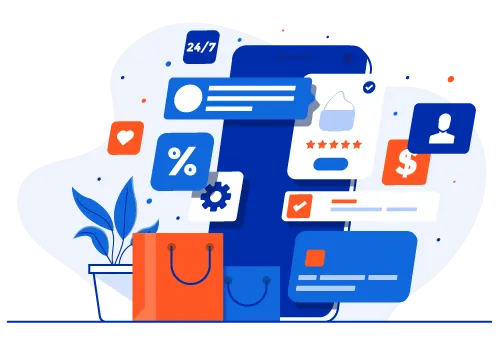
eCommerce / Direct Selling
Affiliate marketing is not direct selling because you indirectly include products in your content that lead to a sale. However, direct selling techniques basically rely on your own expertise and brand power to sell products directly to online consumers.
How Does Direct Selling Work
With direct sales, you become an influencer selling a brand you believe in. This method requires you to be a brand ambassador and actively support the products you want to sell.
When it comes to your blog, it’s best to use an eCommerce approach to direct selling by setting up an online store or linking to an online store with your own influencer link. Many brands also set up direct seller partners with their own code as well.
This is why it’s important to conduct real reviews, demos, and tutorials of other products, besides the one you’re selling.
Set Up Your Store or Partner Link
Direct sellers using eCommerce strategies need to have an online store where products can be purchased.
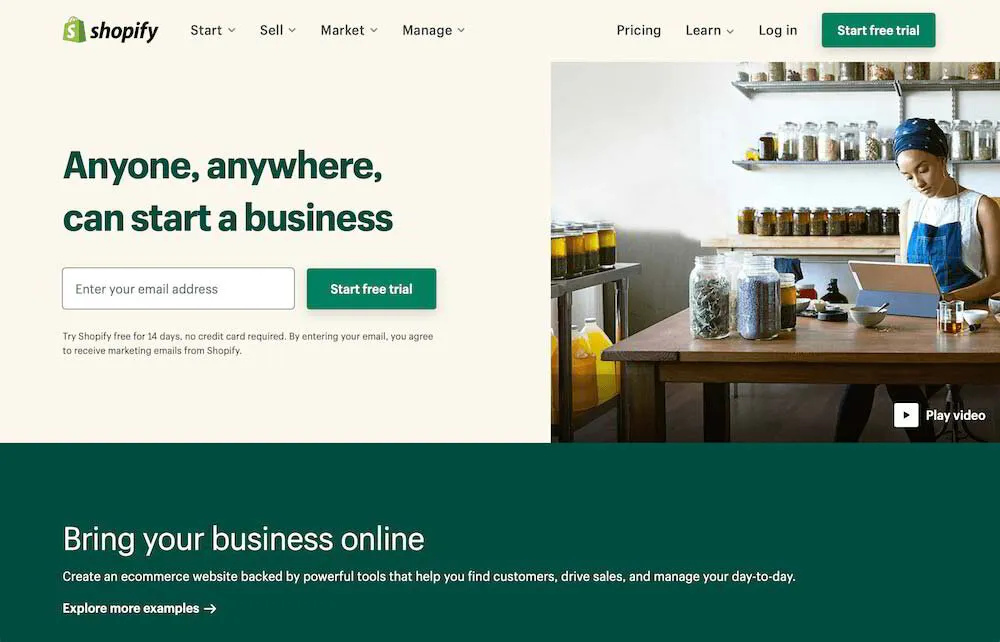
How Does Direct Selling Work
Shopify is probably the best and quickest way to set up these stores, but others also use Facebook and Instagram to build shops directly on social media.
Vary Up Your Content
People follow blogs because they are well-crafted towards their niche and focus on keyword research. You don’t want to make post after post about a product you’re selling.
Instead, you’ll focus on the niche and answer questions from your audience, building up your keywords and SEO content.
As you increase traffic to your blog, you’ll be able to start making some posts about products you really love and can even include display ads and links within your sponsored post.
Create a Sponsored Post Policy
If you are posting sponsored content, it’s best to let your readers know beforehand with a sponsored post policy. You can link this at the beginning or end of the post.
This policy typically provides a disclaimer on who, what, and why you’re writing a sponsored post, as well as any statements on your personal opinion.
For example:
Some bloggers will write “this post is sponsored, but the opinions are my own.” This shows that you are still objective, even if you are directly selling a product within your post.
Offer Free Samples to Get Started
This trick never gets old for direct selling. If you want to share a great product, you can simply provide free samples or even create a social contest giveaway to promote the product further.
This creates loyalty with customers and promotes positive relationships with the product.
Set Up Email Marketing
You can use email marketing as a direct line to customers who sign up, but you shouldn’t abuse this access. When promoting products via email, you want to make it personable and include lots of visuals with a clear call-to-action.
It’s easy to combine your blog with direct selling and email marketing as they all go hand in hand. People who like your blog will ultimately sign up to receive alerts when you post, and as you build up your list, you can directly advertise your fave products.
However, email marketing can be difficult to maintain, and subscribers may unsubscribe if you send too many emails about different products. Your goal is to build trust and only send emails promoting products you truly believe in.
Share With Social Media
Direct sellers tend to be influencers with a strong social media following.
While you may get your start with blogging and linking to your content, your social media page can help you share content from your website and products you want to sell. You may even decide to set up your own Instagram shop or use special codes for your posts that followers can use to buy products.
Sell Your Online Course or Book
Bloggers have a lot of power if they write well. Visitors will come from all over to read your content and learn something new.
So why not turn this into a real teachable moment? There are two approaches to this method.
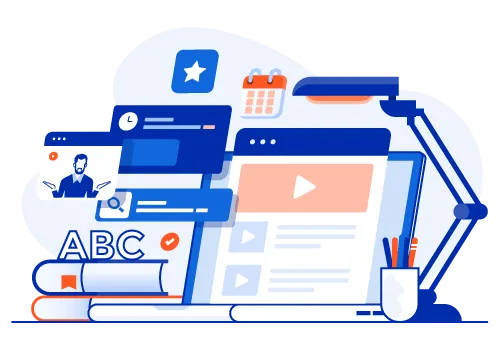
Selling eBooks on Your Blog
If you write your own books, then you can advertise them through your blog. It’s also the best way to build up your authority on the subject matter. One of the best ways to do this is by offering a free chapter to read from the book in an initial post, and then continue to expand on the material while never giving away the secrets within your book.
Of course, this method takes a while as you’ll have to write the ebook first. Some ebooks can be written in a matter of days, while others may take a year. A typical ebook is around 2,500 words with about 300 to 350 words in each section.
Longer ebooks should be formatted and styled for easy readability, as you want people to digest chunks of information but still feel intrigued.
Ebook authors can make anywhere from $0.99/sale to over $10,000/month depending on how you market the book.
Teach an Online Course
Do you want to truly help people with a step-by-step course that will make them an expert like you?
Online courses have become an incredibly popular way to monetize blogs online because people are already searching for answers and looking for ways to better themselves.
When you offer an online course through your blog, you are asking someone to sign up for an e-course based on your own curriculum and content. But don’t you have to have web design and development experience to build a virtual course?
Actually, there are a variety of plugins and course builders that help you build courses overnight. For example, you could use Teachable to create and sell an online course on any subject you choose.
Blogging to Sell Your Content: eBook or Online Course?
If you have a knack for writing, why not do both? Some visitors will prefer an eBook to an online course, while others need step-by-step handholding to learn complex topics.
This is why having both can truly help you monetize your blog in every way. As an expert, you can create a book that can be sold on Amazon or any online ebook marketplace, and you can market your book by writing expert content on your blog.
You can also create a course that likely costs more than the eBook because it gives away more knowledge and takes more time to complete. There are also new online marketplaces for these courses, such as Udemy.com and Teachable.com where you can advertise your courses and blog.



